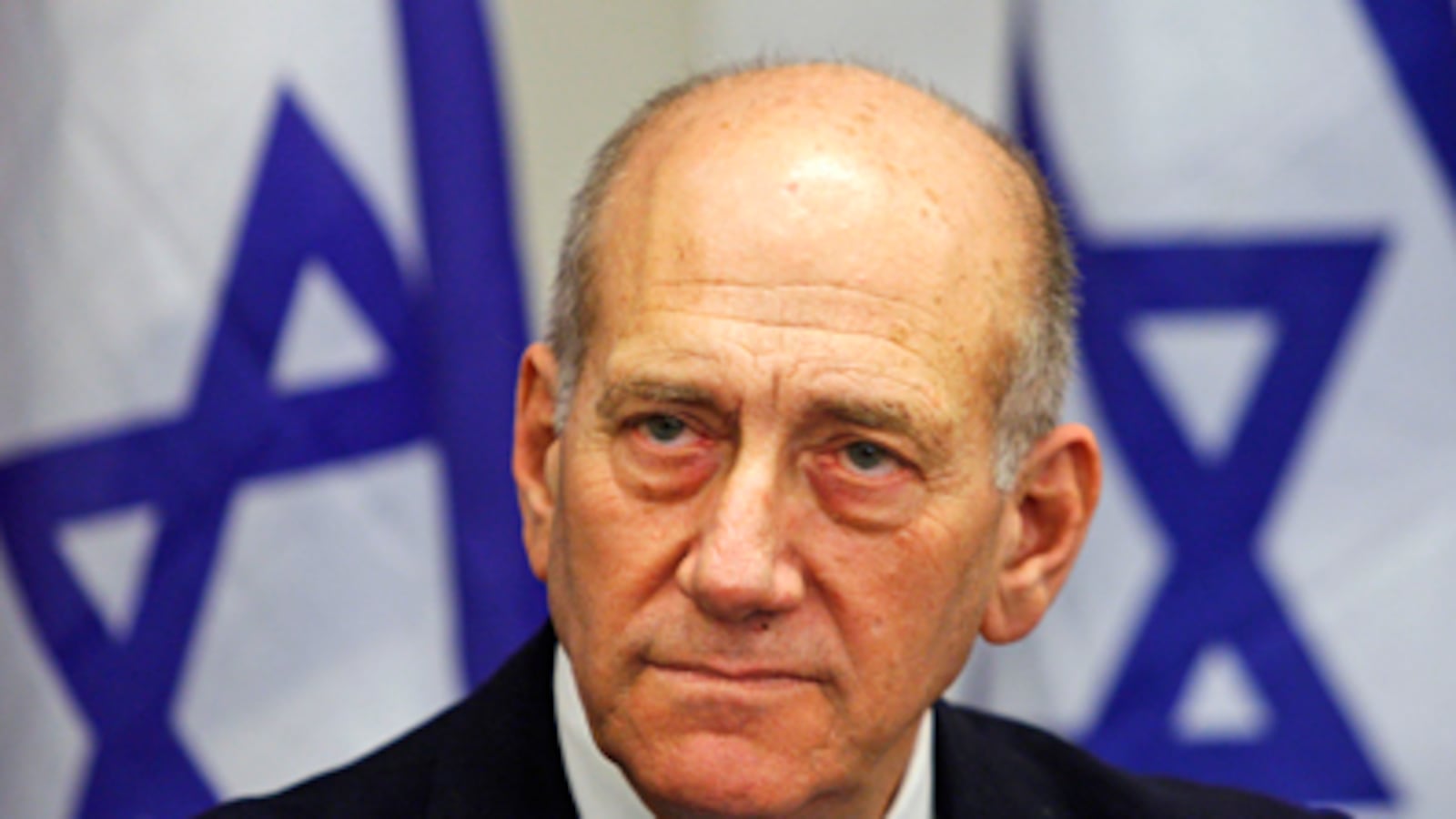“Recalling how many of you were against me last year, I’m getting scared,” Former Israeli Prime Minister Ehud Olmert joked at the beginning of his address to yesterday’s second annual Jerusalem Post Conference in New York. It was a funny start to a quasi-comic performance in which Olmert, alternately jokey and defensive, acted almost like a medieval court jester, silly antics serving as a mask for serious political critique. And Olmert had good reason to be “scared” of his audience: they expressed displeasure with nearly everything he said, from calling on Israel to reduce its security budget to insisting on the need for a Palestinian state.
Olmert began by promising that “I will do what I always do when speaking to you: I will not criticize the Israeli government. One of the ministers sitting here told me that it’s not appropriate to criticize Israel overseas.” The crowd missed the irony in his tone and applauded this statement wholeheartedly. “However,” Olmert continued, causing the audience members to laugh before falling back into a mistrustful silence, “I want to share with you some of my thoughts and perceptions.”

Perhaps the most controversial perception was Olmert’s idea that Israel can now afford to shift its priorities—to dramatically reduce the security budget and dramatically increase the education and welfare budget—because “the strategic situation of the state of Israel is perhaps better than it has been in many, many years, and there is not a serious strategic danger to the wellbeing of the state of Israel.” This statement contrasted sharply with Israeli Prime Minister Netanyahu’s rhetoric—clearly more to the audience’s taste—which often emphasizes the existential dangers facing Israel. Speaking over the loud heckling now emanating from the crowd (“That’s insane!” shouted the woman behind me), Olmert insisted that in the next 5-10 years Israel can rest relatively easy. “There is not any other country at this point which threatens the existence of the state of Israel and which can carry on a ground and air war similar to what we had to deal with in the past,” he said, citing Jordan’s stable relations with Israel and Egypt’s helpfulness in brokering the recent Israel-Hamas ceasefire. He admitted that “Syria is a major problem,” but pointed out that whoever will take over after Bashar al-Assad is overthrown “will not be able to take charge of Syria overnight to the degree that they will then be able to look at Israel and express their discontent.”
As for Iran, Olmert stated, “I disagree with those who say that the Iranians have arrived at the red line drawn by the Israeli prime minister in his famous appearance at the United Nations [last September].” He added that “we have exaggerated for a long time,” not in regard to the direness of the potential threat, but in regard to how close Iran actually is to possessing a nuclear weapon. Olmert insisted that when the U.S. president, secretary of defense, and secretary of state all declare time and again that America will not allow Iran to go nuclear, Israelis must take them seriously. “President Obama doesn’t want to be seen as someone whose legacy is a nuclear Iran. I don’t think Chuck Hagel wants it. I don’t think Kerry wants it.” (This is a joke,” interjected the man beside me). “I suggest we continue to work closely, intimately, and quietly with America, rather than use every platform to explain to the United States what to do,” Olmert added, hinting back to Netanyahu’s U.N. speech. “We don’t need to embarrass the president with public statements.”
Olmert also acknowledged the threat of Palestinian terror, but noted that right now “it’s more a potential than a present issue. Because, as we all know, the nature and intensity of this threat has changed dramatically over the past 7 years, since the second war in Lebanon.” He took advantage of this moment to remind the audience of his own government’s “great success” in combating terror—he cited Operation Cast Lead—before insisting that Israel will be able to do so even more effectively if it withdraws to its internationally recognized borders. “To those who say those borders will be indefensible, I say…we know how to deal with terror better when there is no international criticism, no U.N. against us.” He stated that Israel’s current relationship with the Palestinians is “completely inadequate” and that the two-state solution is the only way to safeguard Israel’s future as a Jewish and democratic state. Playing the jester again, Olmert offered a very understated critique of Netanyahu’s position on two states, calling it “somewhat vague” and “not as eloquent and explicit as he can make it.” Finally, he warned that if Israel doesn’t make room for a Palestinian state, “we will be isolated in the world—not because they hate us, but because they don’t want to have Israel as the occupier of people who do not have equal rights.” This last statement drew a chorus of loud boos from the crowd, with shouts of “Grow up!” and “Shut up!” interspersed for good measure.
But the most striking moment came when Olmert waxed elegiac:
What can I tell you? Life is somewhat complex. One morning you wake up and you have to fight the terrorists—and I did it with more determination…than any of the prime ministers before me. But one morning you wake up and ask yourself: what am I leaving for my children and grandchildren? A reality of endless war and confrontation and blood that will destabilize the life of the people in our country—or a glimpse of hope that things will be different, that there may be a chance, and that if there is a chance, we will not be the ones that missed it because of prejudices…
The heckling from the peanut gallery was now so loud that it drowned out the rest of Olmert’s sentence. Even before he could finish asking the question, it seemed, they had answered it.
Olmert took his leave with a sarcastic, though not angry, expression of gratitude. “Thank you for the friendly, patient restraint, and the supportive manner in which you have received me!” he laughed. His impulse to play the fool, to make light of the situation, was understandable: faced with a crowd so obstinately unwilling to hear him out with even a minimal level of respect—never mind take his words of warning seriously—there was nothing left for him to do but joke.






